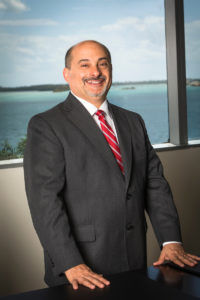Edward H. Davis, Jr., selected as a Who’s Who Legal Thought Leader
Who’s Who Legal: Thought Leaders 2018 brings together the insight, expertise and wisdom of some of the world’s foremost lawyers in a single book.
This year’s edition features Q&As with 67 eminent practitioners across 22 practice areas. These lawyers obtained the highest number of nominations from peers, corporate counsel and other market sources in our most recent research cycle.
Edward H. Davis, Jr.
 Questions and Answers:
Questions and Answers:
Who’s Who Legal Thought Leaders: Asset Recovery
Edward H Davis, Jr, a founding shareholder of the international law firm Astigarraga Davis, heads the firm’s asset recovery and financial fraud group which represents victims of serious fraud and grand corruption including governments, corporations, insolvency practitioners and individuals by investigating and prosecuting civil fraud and asset recovery actions.
Who’s Who Legal: Asset Recovery has recognised Davis as the global Asset Recovery Lawyer of the Year from 2013 to 2016, and his firm as Asset Recovery Firm of the Year for 2015 and 2016.
WHY DID YOU DECIDE TO SPECIALISE IN ASSET RECOVERY AND FRAUD WORK?
I enjoy representing victims and helping them level the playing field with those that prey on them. As a result, I decided to focus my practice on the representation of individual, corporate and governmental victims of fraud throughout the world. I also enjoy learning about other legal cultures, and asset recovery and fraud work is a specialised form of international litigation. Lastly, I enjoy the “hunt” for those that have committed fraud and their ill-gotten gains.
WHAT PROMPTED YOU TO FOUND YOUR OWN FIRM?
My partners and I were seeking a better way to serve our clients in response to new factors in the industry affecting both the legal profession and our clients. Having a specialised boutique allows us to employ our “power of focus” concept and truly focus deeply on our practice groups and developments in the law to a degree that might not be attainable in a more generalised platform. Also, our boutique setting is nimbler and more cost-effective than that of many other firms, and allows us to take cases on alternative fee structures.
WHAT MAKES FOR A SUCCESSFUL ASSET RECOVERY SPECIALIST?
The actions taken in the first days following the discovery of a fraud often will determine whether the misappropriated funds or other property are ultimately recovered. Our team responds quickly to such fraud by using emergency injunctions, expedited depositions, subpoenas of bank records, our vast connections to experienced professionals and investigators around the world to seek to either locate the assets before they are dissipated or to investigate and bring claims against third parties who assisted the fraudsters.
WHAT IS THE MOST MEMORABLE MATTER THAT YOU’VE WORKED ON TO DATE?
Stanford International Bank, Ltd was an Antiguan bank that sold phony certificates of deposit to 21,000 depositors, which resulted in the second-largest Ponzi scheme in history by causing losses to over 27,000 depositor-victims from around the world. Estimated losses by depositor-victims exceeded $5 billion.
WHAT CHALLENGES ARE FACING PRACTITIONERS AT THE MOMENT AND HOW IS YOUR FIRM LOOKING TO MEET THESE OBSTACLES?
The pressure from clients to keep legal fees and costs as low as possible continues to be one of the challenges affecting practitioners. This can be a problem because of the crisis-like atmosphere in which successful asset recovery practitioners function. We combat these challenges by working closely with investigators, computer forensic experts, foreign lawyers, forensic accountants, law enforcement and other experts. These professionals are key resources in a rapid response to a discovered fraud which can lead to escalated costs (such as cost bonds) which would not be the norm in another practice area. Our firm has been meeting this particular challenge by offering alternative fee arrangements when historically the standard was solely hourly fee billing, and by working with litigation funders that assist victims of fraud who usually don’t have the resources to fight the fraudster after the fraud.
DO YOU ANTICIPATE THAT THE INTERNATIONAL COMMUNITY’S INCREASING READINESS TO TACKLE CORRUPTION WILL LEAD TO GROWING INTEREST IN ASSET RECOVERY WORK IN THE WIDER LEGAL MARKET?
Yes, as technology continues to get more sophisticated, the speed of the movement of money throughout the world will likewise increase. This, combined with a growing awareness that national borders are no more an impediment to recovery than they are to the fraudster who moves across those same borders, will likely result in the interest in asset recovery work growing into a larger distinct legal market. We already see firms forming asset recovery departments and groups which is a signal that that the market is recognising this distinct practice area as an exciting new offering to their clients.
HOW IMPORTANT ARE ORGANISATIONS SUCH THE ICC COMMERCIAL CRIMES SERVICES’ FRAUDNET NETWORK IN INTERNATIONAL ASSET RECOVERY WORK?
Organizations like the ICC’s FraudNet are very important and necessary in the international asset recovery work. Fraudsters work using their own networks of cronies and those that provide them assistance – legal and otherwise. So it is essential that counter-networks operate at a high level of coordination to defeat them. They also are powerful change agents that raise awareness and educate fraud victims worldwide about the methods that can be deployed to assist them in their fight to recover their assets and damages.
AS HEAD OF THE FIRM’S ASSET RECOVERY AND FINANCIAL FRAUD PRACTICE, IN WHAT WAYS ARE YOU ATTEMPTING TO DISTINGUISH YOUR GROUP FROM OTHER COMPETITORS IN THE MARKET?
I work on creating innovative solutions. I’ve helped develop and expand various creative discovery and asset seizure methodologies to obtain recoveries for our clients. Additionally, I’ve both led and worked collaboratively on various civil asset recovery teams – another concept I helped pioneer – on cross-border asset recovery engagements. Having a strong commercial litigation and insolvency background, my team and I have championed and coordinated asset recovery efforts between civil and criminal systems as a means to penetrate and defeat complex opaque asset hiding structures used by fraudsters. I was recently mentioned by Latin Lawyer (2016) for my efforts in the area of asset recovery. Lastly, as a result of our efforts, I was also recognised as the global Asset Recovery Lawyer of the Year by Who’s Who Legal: Asset Recovery, in 2013 (and again in 2014, 2015 and 2016); my firm was recognised as the Asset Recovery Firm of the Year in 2015 and 2016 by the same publication.





Sequor Law es una firma internacional de abogados que representa instituciones financieras, gobiernos soberanos, empresas estatales, empresas públicas y privadas, profesionales de insolvencia y clientes individuales en las áreas de recuperación de activos, fraude financiero, insolvencia y litigios de servicios financieros.